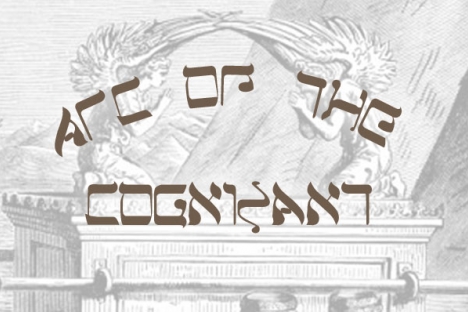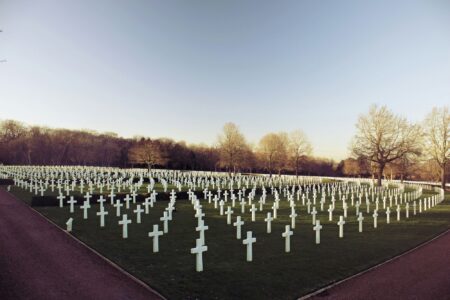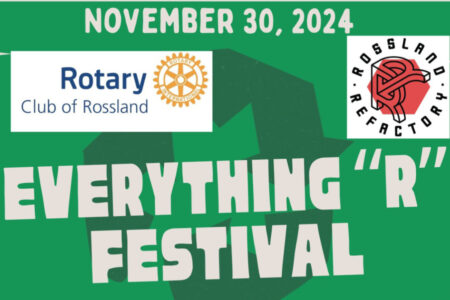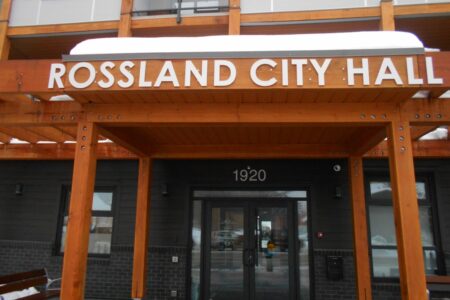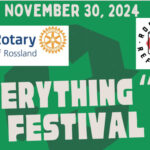COLUMN: An unprecedented political order coming?
In the time of not-yet-born/not-yet-dead for Western being
Things are going to slide, slide in all directions
Won't be nothing (won't be)
Nothing you can measure anymore
The blizzard, the blizzard of the world
Has crossed the threshold
And it's overturned
The order of the soul.
…stuff it up the hole
In your culture
Give me back the Berlin wall
Give me Stalin and St. Paul
I've seen the future, brother
It is murder — Leonard Cohen, The Future
Surely some revelation is at hand /… a vast image out of Spiritus Mundi/ Troubles my sight…
And what rough beast, its hour come round at last / Slouches toward Bethlehem to be born?
— William Butler Yeats,The Second Coming
This is a long essay, in four parts to be published at intervals in the Arc of the Cognizant.
The Hanged Man? A symbol for our “time between Stories”
Today, I address the future. Never a wise topic for a hypothesis, prediction.
The hypothesis is, there is a strange political order coming and it has no precedent in history; it will be a hybridized form, a form with some familiar outlines, and others completely novel. I focus now on politics, but the bigger picture encompasses change beyond just that one realm into a future transforming all human affairs.
So here, dear reader, is where the writer of this column gets in touch with his weird. I wish you to look at an image of the Tarot card called “The Hanged Man”.
The Man is in a door-frame, suspended between earth and sky; he is upside down, his arms are bound behind his back, his face betrays no anxiety about his predicament. He in fact seems at peace, while the exact placement of his untied leg to form a cross with the tied leg, are to me and many other commentators of Tarot, very mysterious indeed. One wonders why the untied leg is so articulated in this manner.
This hanged figure is on a threshold between worlds, neither on earth nor in the sky, and his peaceful expression suggests transcendence – while his whole posture might be said to resemble a dance step. The world is upside down — or, is it only that the person himself cannot see the world aright?
Around him is the way, a portal. Where to? one asks.
(Image below: from the Rider-Waite Tarot deck, via Wikipedia)
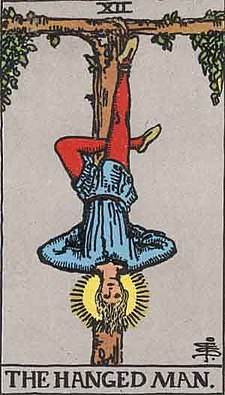
What does this imagery mean for my thesis that transformation is at hand?
This is the perfect icon for the West’s current situation. We are poised on a threshold; we are neither in the familiar world of the recent past nor are we yet in chaos, despite intuitions that we’re on the very verge of unravelling norms and collapsing order. The portal beckons.
The tremblings of seismic change are observed all around Canadians. Each one of us is more-likely agitated by one or two particular signposts: technology, politics, economics, culture, war, religion, and climate — take your pick of anxieties. Crucial new challenges like lethal addiction, homeless poverty, novel health threats — in previously rich, stable Western societies – add to our sense of being at the point of decision.
Politics in what we call liberal democracy is the realm of transformation claiming my attention.
Threat to our politics: what is democratic society coming to?
Liberal democracy in the West is under threat/in peril, or in troubled times; one hears and sees this comment everywhere.
Here are some readings that sample opinion on the matter:
https://www.nytimes.com/2020/07/22/opinion/liberals-conservatives-trump-america.html
https://harpers.org/archive/2020/12/the-silenced-majority/
To answer the question driving this essay, is democracy in a twilight era? Yes.
I think democracy as we have known it is fading, but not because the replacement for this political order is already born and pushing to remove democracy with an alternative order. Autocracy is old, one-man tyranny is old; but the new order will not be these. Too much in the human world is changed for old forms to simply overthrow democracy and take its place. Human consciousness is altering.
The new order will not merit the term democracy. It will demand a new word.
The Space between Stories
The preferred imagery of Charles Eisenstein, as he observes our threshold time, is to say humanity is “between stories” — and he makes a strong case for this way of seeing it.
He asserts that the old Story of the People no longer persuades enough of us, and yet – there is so far no New Story to claim the allegiance of the vast majority of us.
“I wish I could tell you that I am ready for a new Story of the People, but even though I am among its many weavers, I cannot yet fully inhabit the new vestments. In other words, describing the world that could be, something inside me doubts, rejects, and underneath the doubt is a hurting thing. The breakdown of the old story is kind of a healing process that uncovers the old wounds hidden under its fabric and exposes them to the healing light of awareness.”
Read his long essay here. https://charleseisenstein.org/essays/2013-the-space-between-stories/
Or see an 8-minute video here. https://www.filmsforaction.org/watch/a-new-story-of-the-people/
What Eisenstein neglects, in my opinion, is an appreciation for the very great probability that the world he is projecting will be powerfully fractured as usual. Not more beautiful for all of us, only some of us. Others will not be within the borders of the better-ordered world he can envision.
The planet will have zones of peace and others of chaos and violence, as has been true for most of human history. In fact, I think even Eisenstein recognizes the odds against a just sharing of the good life in the more beautiful world our hearts know is possible. (this phrase is his own brand)
The Better Life: desired by outsiders, enjoyed by Canadians
I’ll return to this point in my conclusions, for it is to me of paramount significance: Canadians – and we share this with other people living in Western democracies — accept the cognitive dissonance of living well and long in our rich liberal capitalist democracy while all around us the news media report vast suffering masses of humanity. Our moral, ethical, and religious traditions imbibed from a childhood in Canada would seem to militate against our tolerating this. But we know both realities and we tolerate the dissonance.
Homo sapiens in many teachings on spirituality yearns toward love for all its members: that is the theory; but in practice, nations eschew universal love and inequality thrives. Jesus and Buddha asked us to be better. We try. We fail.
I turn, as I often do, to poetry in song lyrics that will communicate my feelings about the West and its wealth, to catch the flavour of Western privilege in a world of poverty. This is Neil Young’s poetry, in his song lyric for The Restless Consumer.
The people have heard the news
The people have spoken
You may not like what they said
But they weren't jokin'
Way out on the desert sands
Lies a desperate lover
They call her the "Queen of Oil"
So much to discover.
Don't need no ad machine
Telling me what I need
Don't need no Madison Avenue War
Don't need no more boxes I can't see
Covered in flags but I can't see them on TV
Don't need no more lies.
The restless consumer flies
Around the world each day
With such an appetite for taste and grace
And goodness.
People from around the world
Need someone to listen
We're starving and dying from our disease
We need your medicine
How do you pay for war
And leave us dyin'?
When you could do so much more
You're not even tryin'
Don't need no TV ad
Telling me how sick I am
Don't need to know how many people are like me
Don't need no dizziness
Don't need no nausea
Don't need no side effects like diarrhea or sexual death
Don't need no more lies.
The restless consumer lies
Asleep in her hotel
With such an appetite
For anything that sells.
A hundred voices from a hundred lands
Need someone to listen
People are starving here and there
They don't see the world the way you do
There is no mission accomplished here
Just death to thousands
A hundred voices from a hundred lands
Cry out in unison
Don't need no terror squad
Don't want no damned Jihad
Blowin' themselves away in my ‘hood
But we don't talk to them
So we don't learn from them
Hate don't negotiate with Good
Don't need no more lies.
The restless consumer flies
Around the world each day
With such an appetite for efficiency
And pace.
Don't need no more lies.
I believe this song makes all the necessary points about Western “first-world” status in the perspective of peoples not within the charmed circle of our affluent democracies. Surely the reader recognizes someone among their friends who is suggestive of “the restless consumer” sketched in the song… ?
Surely the reader recognizes him- or herself, disgusted by TV, war, and oil politics.
Politics: the agitation of Western citizens
It’s appropriate that I should give context for my personal feelings about liberal democracy.
I teach a class to seniors at Selkirk, in the Learning in Retirement [LIR] program, and the course title I chose is, “Headlines and History”. I ask the class to bring me one or a few topics picked from the news of each week between classes. I provide historical deepening under the news story. My role as teacher is to be one who knows more depths in history, and applies the methods of historians, for the study of events that are making headlines; all of us are equally followers of the news.
Generally, the students have some interest in current events. None of us has been so prominent in our lives that we might, any of us, be labelled a “news-maker”; we’re news-readers or -consumers. We are citizens in Canadian democracy where being informed is somewhat of a civic duty, because we vote and our opinions should be informed. Opinions and politics uninformed by fact do not earn our respect.
The class is quite variegated in age and professional credentials and life experiences, but we are all over 55 and all European-Canadians, the oldest among us having reached the ripe old age of 88. It has emerged over weeks of classes that one could call us liberals in our politics, with liberal and progressive views in matters of feminism, the environment, poverty, and Canada’s aboriginal peoples.
My class brought up the topic of liberal democracy under threat, from their various perspectives on news stories about Fascists in Italy, Populism in the USA, and anti-Western rhetoric of great powers in the world like China, Russia, Iran, India, and Brazil. This essay is my rather slower, later response to their concerns, after spontaneous immediate reactions on the day of the discussion.
Later in this essay I will return to the discussions I witness in my classroom.
West-centric self-esteem vs. the non-west’s refusal of our hegemony
It's the edge of the world and all of Western civilization
The sun may rise in the East at least it's settled in a final location
— Red Hot Chili Peppers, Californication
Not all the world loves the West.
Its values, cultural norms, legal traditions, and political prescriptions for governance – these are not the only possibilities; alternative norms abound. It might have seemed in 1992, when the Soviet empire had dissolved and Red China still operated a weak economy with no possible claim to equality to the superpower USA, that the West was triumphant. Francis Fukuyama, an American philosopher, struck the note of pleased triumphalism in his essay The End of History, arguing that liberal democracy was the paradigm for nations in the future under the hegemony of a unipolar power, America, and Western civilization. Many people seemed to believe it.
That dream fell apart rather rapidly, and we are painfully aware how others beyond the West do not hold us in the high regard we hold ourselves. Putin and Xi see the West as a place of decline, a has-been civilization sliding toward senility and enfeeblement due to excesses of egoist individualism and lack of collective strength. European nations are not as admiring of America as was once true. While third-world immigrants still want to get to the USA for a better life, particularly people fleeing Latin America where regimes are murderous (Guatemala), many prefer Canada or other Western destinations.
China and Russia, Turkey and Iran, Islamist autocrats and Latin-American strongmen, all offer themselves as alternate and superior models for emulation, better than the West. We tell ourselves their people desire to be more like us, that protests in the streets of those nations indicate that the people want to copy us. The protestors against government there tell our news media that they do indeed want Western democracy, rule of law, and human rights. We feel we are the cutting edge of world progress, that given the freedom to choose, Chinese and Russians would move their systems into alignment with Western ways of political order.
A future: liberal democracy replaced
Fukuyama got this correct in his essay: there is as yet no new political idea, form, or theory at present on the global scene that promises to supplant liberal democracy.
All the possibilities from anarchism to autocracy, populism to plutocracy, aboriginal tribal order to theocracy, totalitarian society to libertarian commune, have been seen before. Social engineering by states, religions, ideologies, philosophy (think Plato and his Republic) has been attempted on humans throughout recorded history, in search of a human improved by the blueprint of the knowing few who rule the masses.
When liberal democracy fades from the planet, it will be replaced by a new thing entirely. (If the word “thing” seems clumsy to my reader, reflect that the best way Romans could describe their state was as a “res” — a thing – in their word republic, res publica.) It will still focus on the freedom of individuals. More I cannot foresee.
And, in case I have not been explicit enough about my own political sympathy: I am liberal, once welcoming Marxian/progressive labels but not now. I have no theoretic allegiance to any politics other than democratic ones. I dislike the word “woke” and the phrase “social justice warrior.” Yet I align with the values of those visionaries.
[the word woke in politics is hugely problematic: https://en.wikipedia.org/wiki/Woke
Liberalis a rather vague term, I admit. Yet I am comfortable with the murkiness. I am concerned with liberation, of individuals, of collectives, of all humans who live under systems where their value as beings with rights is not respected. Canada is not without its defects, but I am still living here. For me in my life at this time, there is no better choice on earth. My liberal politics are not likely to change much, but I am open to events that transform my mind.
In Part Two of this essay, I will explore the ancient history of the Athenian demos. I end Part One here, planning in the next edition to sketch the West’s democratic origins and my own stance on the ideology of Progress.


